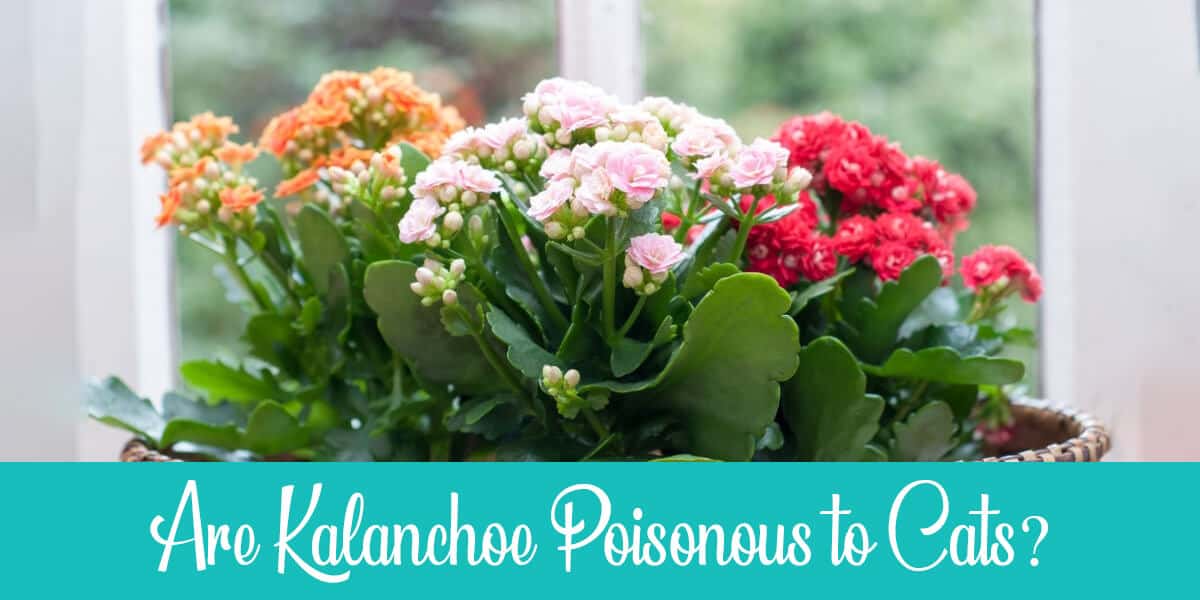Kalanchoes are beautiful houseplants that are well known for their stunning foliage and colorful blooms. Unfortunately, these bright flowers may catch the attention of your cat.
If your cat likes to nibble on the flowers and leaves of your houseplants, then you might want to ask yourself, “Is Kalanchoe poisonous to cats?”
In this article, we’ll be answering your questions related to Kalanchoe poisoning and sharing with you important tips to deal with a poisoned cat.
Let’s get started!
Table of Contents
Is Kalanchoe Poisonous to Cats
The short answer is yes. Although rarely fatal, Kalanchoe is poisonous to cats and can cause serious harm in large doses. If your cat ingests a small amount of the plant, you shouldn’t notice anything more than excess salivation, stomach upsets, and diarrhea.
Other less common symptoms include irregular heartbeats, cold extremities, and weakness.
Effects of Kalanchoe Poisoning on Cats
The toxic principle of Kalanchoe is called Bufodienolides. This compound has a steroid structure and includes many forms of poisonous glycosides.
The effects of Kalanchoe on cats should appear after a few hours of ingestion. If you notice your cat is in severe pain or distress, call your vet immediately.
Excess Salivation
The first sign of Kalanchoe poisoning is excess salivation. This is usually not a cause of concern. However, it may affect your cat’s ability to eat and carry on normal activities.
If you don’t notice any other adverse effects, you may not need to take your cat to the vet. Instead, call your vet and let them know about the situation.
In the meantime, provide your cat with plenty of fluids and comfort it if it gets stressed out. The effects of salivation shouldn’t persist for more than a few hours.
Gastric Upsets
This is the most common sign of Kalanchoe poisoning. Gastric upsets start just a couple of hours after ingestion.
Your cat may experience abdominal pain that varies in severity. You may also notice bloating and gas for up to 24 hours after ingestion.
Some gastric upsets without diarrhea are usually a sign of mild poisoning. Mild poisoning resolves on its own and usually doesn’t require a visit to the vet.
However, if your cat is visibly in pain, stops eating, or you notice excessive diarrhea, you should take them to the vet for further examination.
Related: Are Gardenias toxic to cats?
Diarrhea

Diarrhea is also a common adverse effect of Kalanchoe poisoning. It’s usually accompanied by abdominal pain but doesn’t last as long.
If you notice some loose stool but your cat seems fine otherwise, call your vet and explain the situation. Your vet may advise you to give your cat some rich-in-fiber foods and keep them under observation.
However, severe diarrhea with signs of distress is usually a sign of acute poisoning. If your cat is unable to carry on its daily activities and seems in pain, take them to the vet immediately.
Blood in stool is extremely rare, but it’s a sign of something serious. Even traces of blood in the stool require hospitalization for further examination.
Vomiting
Vomiting isn’t a common adverse effect but can come with excess salivation and bloating. If the vomiting is a one-time occurrence and doesn’t come with serious signs of distress, call your vet.
Your vet will ask you to see if your cat vomits again. If it does, the vet will ask you to bring your cat over for further examination.
Cats that frequently vomit from fur balls or other issues are more likely to vomit from Kalanchoe poisoning.
Irregular Heartbeat
The ASPCA says that abnormal heart rhythm is rare, but still possible with high doses of Kalanchoe.
Experts say cats that ingest the flower are more likely to experience cardiovascular effects. This is because the glycosides are present in larger amounts in the flower than the leaves.
The best way to look for CV effects is by measuring your cat’s heartbeat. Put one hand right behind your cat’s front leg and feel its pulse. Count the heartbeats over 15 seconds and multiply the number by four. This will give you the number of beats per minute.
The normal heart rate for cats ranges from 140 to 220 BPM. If you notice the heart rate is lower or higher, call the vet immediately. If you notice any irregularities in the heart rhythm, let your vet know as well.
Irregular heartbeat also comes with extreme weakness, confusion, and unconsciousness. This is one of the most life-threatening adverse effects of Kalanchoe poisoning.
Weakness
Weakness and lethargy are common with Kalanchoe poisoning. You may notice that your cat becomes inactive or sleeps a lot.
Some lethargy is no cause for concern. However, weakness accompanied by severe diarrhea, severe vomiting, or irregular heartbeats indicates your cat needs hospitalization.
If your cat feels weak with no other symptoms, let your vet know. However, if the weakness persists for over two days, take your cat to the vet for further examination.
Cold Extremities
Experiencing cold extremities is a rare adverse effect that is usually accompanied by cardiovascular issues. Even if your cat doesn’t display any signs of distress, it’s a good idea to let your vet know about the cold extremities.
Cold extremities include the tail, paws, and ears. This is more common in colder climates. If you notice some muscle stiffness, call your vet immediately.
Related Posts:
– Are Dracaena Dangerous for Cats?
– Are Daffodils Harmful to Cats?
What to Do If Your Cat Is Poisoned
Most cases of Kalanchoe poisoning don’t require a visit to the vet. However, the ASPCA strongly advises you to contact the Animal Poison Control hotline if you suspect your cat has ingested the poisonous plant.
Some stomach upsets shouldn’t be a cause of major concern, but you should look for any signs of cardiovascular effects.
Aside from some stomach upsets, your cat might also have diarrhea. You should offer your cat plenty of fluids to avoid dehydration and call your vet if you notice excessive diarrhea. Other signs to look out for are loss of appetite, weakness, or severe vomiting.
In Conclusion
You should keep Kalanchoe away from cats to avoid them getting poisoned. If you suspect your cat got poisoned, don’t fret. Look for signs of adverse effects and call your vet if you notice your cat is in distress.
If the effects are mild, your cat should recover completely within 24 hours.

I’ve been living with cats since 2008 and I can confidently say I have more feline friends than humans lol. I currently live with 5 cats in different life stages; two of them are less than one year old, one is 2-ish years old and the oldest two are 9-ish years old. I’ve developed a strong bond with cats over the years and I’m eager to share my experience through this blog. You can learn more about my cats here.

